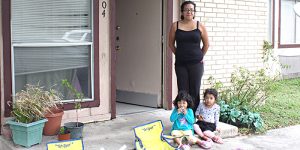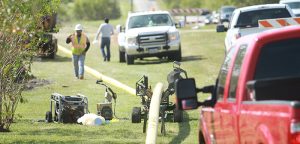By Andy Sevilla
Homeowners of an east Kyle neighborhood pelted with excessive fees and liens, now deemed invalid, received some relief from council after city leaders nullified a $4,600 obligation pushed on them.
Through fast-tracked legislation Kyle council members did away with liens they identified as illegally filed on properties within the Bunton Creek Village Public Improvement District (Bunton Creek PID), and also will reassess the financial obligations property owners have for improvements made in their neighborhood.
“I’m optimistic that this is going to be something that’s going to be really helpful, but we still have some ways to go,” Kyle Mayor Todd Webster said in a telephone interview.
Earlier this year, Bunton Creek Village homeowners were surprised with liens on each property for non-payment of assessments due for improvements to their neighborhood. In July 2005, the Kyle council granted C4D-I, Ltd. developers a Public Improvement District to issue debt on the backs of future homeowners to build infrastructure for the planned Bunton Creek Village neighborhood.
The cost for the improvements were to be evenly split among all the property owners within the Bunton Creek PID who would pay them through annual assessments over a 30-year period, or a lump sum. Homeowners, however, told council in April they were never made aware of such assessments and were surprised with liens filed in March on each home.
In May, council members issued a 180-day moratorium on the collection of PID assessments and suspended the liens while city leaders delved into the situation.
The city now finds the PID assessments are “excessive” and “invalid.” An ordinance approved July 16, after first being heard a day prior, states that the assessments levied on homeowners within the Bunton Creek PID will be reassessed.
City Attorney Ken Johnson said in a telephone interview that Qualico KP, LLC, which developed a majority of the subdivision, did almost all of the improvements to the neighborhood and through a corporate resolution in May waived any assessments they would otherwise be entitled to.
Therefore, only the cost for the improvements C4D-I, Ltd. did in the neighborhood will be reassessed over all the homes at Bunton Creek Village. While an exact cost for those improvements is not yet available, Johnson said a third-party involved in the matter estimated that amount at $56,000.
“It should offer a substantial relief to them (Bunton Creek Village homeowners), simply because we’re anticipating the assessments will go way down,” Johnson said.
“It’s kind of a start over,” he said. “We’re going to determine how much is owed, and how much interest is owed, and then go from there. We’ll basically divvy it back up; it’ll be extremely lower.”
Kyle council members moved swiftly in passing the legislation, fearing PID Holdings, Ltd. – which bought the rights for the PID assessments from C4D-I, Ltd. in November 2005, just four months after gaining approval for the PID — would legally challenge their action.
“We did not want the ordinance to get caught up with a temporary restraining order or some kind of injunction. Which means they wouldn’t be able to use the ordinance to do what needs to be done. So we were trying to salvage the ordinance and get it passed,” Johnson said.
Webster echoed Johnson saying that “moving quickly minimized our exposure for collateral attacks against the ordinance.”
And while the newly passed ordinance offers some relief to Bunton Creek Village homeowners, some have already paid the full assessment in effort to remove the filed liens on their homes. But if the reassessments levied on property owners turn out to be less than the $4,600, homeowners who paid the full amount could be refunded the difference, Webster said.
“We’re creating a process that it’s going to give anyone that has a claim against the PID the opportunity to come forward and present that evidence … The best thing for me was where I realized the process we were setting up actually created the possibility for the individuals here — who I believe had money stolen from them — might be able to actually get some recovery.”









